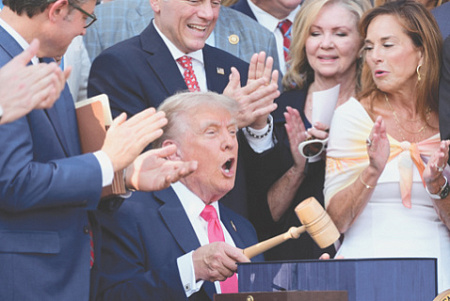
In a move fraught with political risk, President Donald Trump has secured a narrow legislative victory with his controversial budget bill, but at a potentially devastating cost. The passage of the so-called “Big Beautiful Bill” has handed the Democratic Party a powerful rallying cry for the 2026 midterm elections and, more dramatically, triggered a full-blown schism with billionaire Elon Musk, previously a key financial backer of the Republican Party.
The bill itself is a sweeping embodiment of the Trump administration’s policy vision. It allocates an unprecedented increase in defense spending and massive funding for border security while enacting significant tax cuts for the wealthy—a long-standing Republican strategy aimed at stimulating the economy. However, these measures are funded by deep cuts to social spending, most notably to the Medicaid program, which provides healthcare for millions of low-income Americans. The administration argues this will reduce dependency on government aid, but the move has proven deeply unpopular with the electorate.
The legislative battle underscored the bill’s contentiousness. Despite a Republican majority in both houses of Congress, the bill passed the House of Representatives by a razor-thin margin of 218 to 214. In the Senate, the vote resulted in a 50-50 deadlock, forcing Vice President J.D. Vance to cast the deciding tie-breaking vote. The tense outcome revealed significant fractures within the Republican ranks, as several of its own senators refused to support the landmark legislation.
The political fallout was swift and severe. After Trump signed the bill with great ceremony on the 4th of July, Elon Musk made good on his earlier threats. The very next day, he announced he was ceasing all funding for the Republican Party and launching a new political entity called the “America” party. Musk’s primary objection is the bill’s fiscal impact, which is projected to add nearly $600 billion to the budget deficit in the next year alone, undermining his long-advocated goals of reducing government spending and national debt.
According to Vladimir Vasilyev, a chief researcher at the Institute for US and Canadian Studies, Musk’s new party could fundamentally disrupt the American political landscape. While unlikely to win a majority, it could play the role of a powerful spoiler. “In what is likely to be a narrowly divided Congress after the 2026 elections, even a few elected officials from a third party could hold the balance of power, blocking key legislation and appointments,” Vasilyev notes. This development not only poses a direct threat to the Republican Party, from which Musk will likely draw his support, but could also challenge the very foundations of the two-party system that has dominated American politics for over a century.
